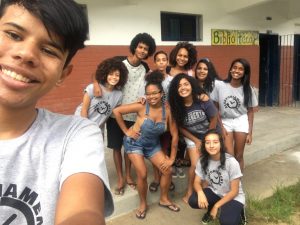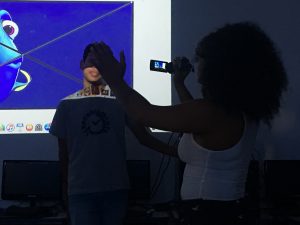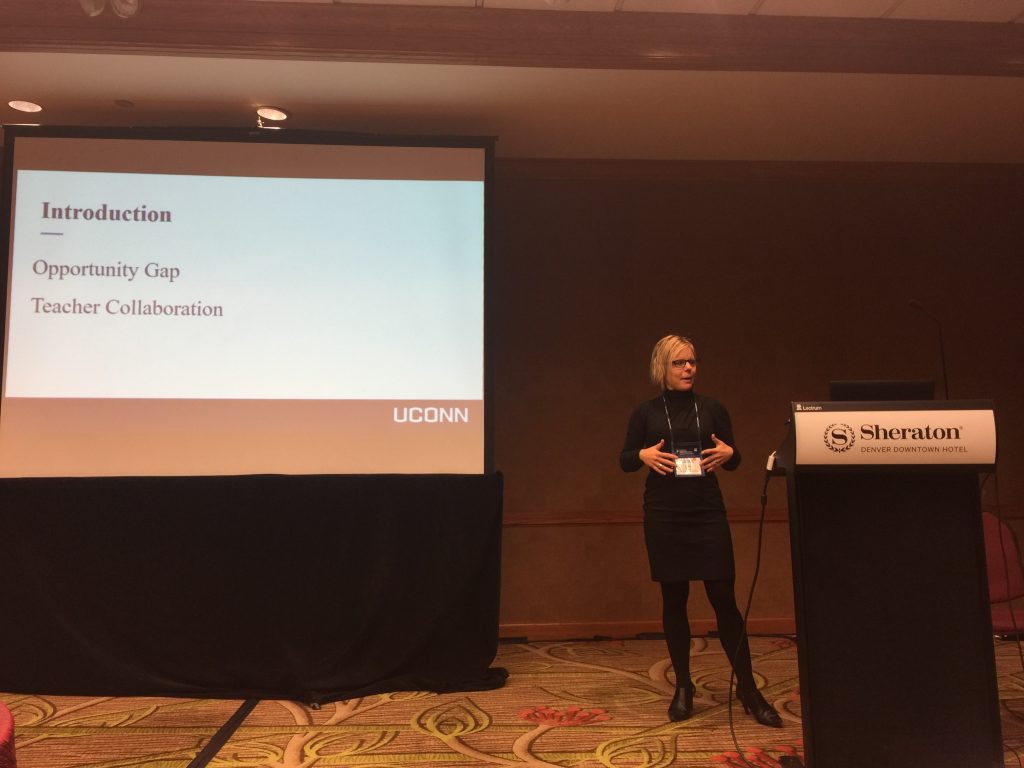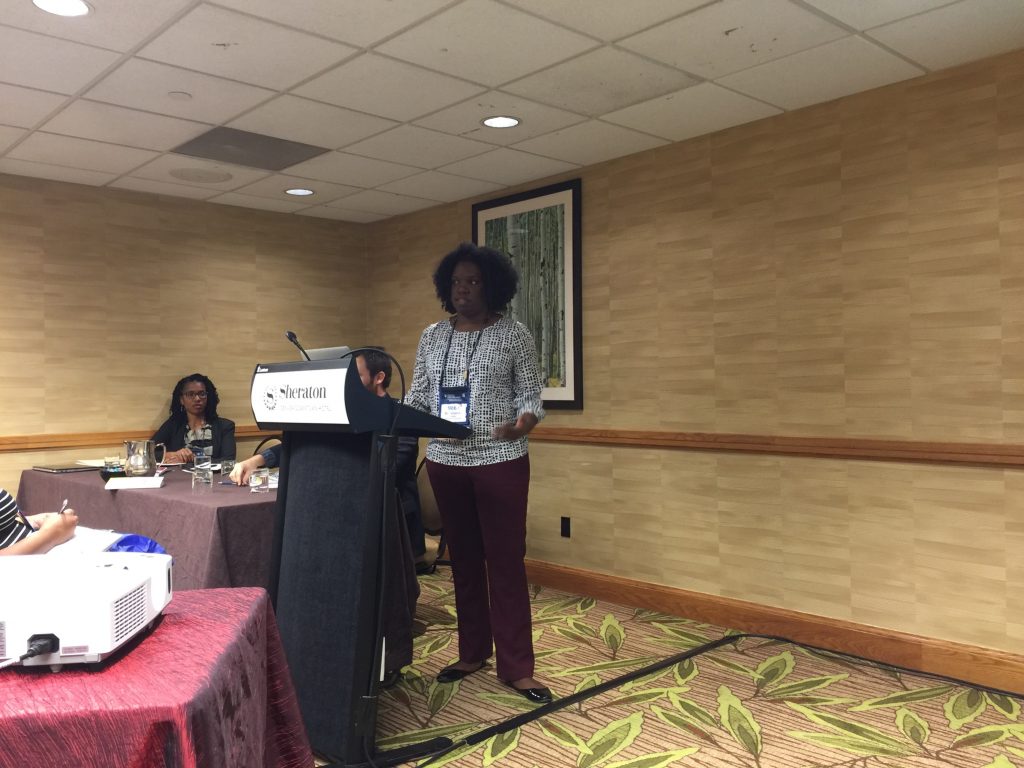Samuel J. Kamin, a doctoral student in the Learning, Leadership, and Education Policy program at the Neag School, prepared the following issue brief on career and technical education in affiliation with the Center for Education Policy Analysis (CEPA), a research center based at the Neag School that seeks to inform educational leaders and policymakers on issues related to the development, implementation, and consequences of education policies.
LLEP
Doctoral Student’s Research Empowers Student Expression through Film in South America

Pauline Batista is a first year doctoral student in the Learning, Leadership and Education Policy program in the Department of Educational Leadership. Her current work goes beyond country borders while challenging the traditional approach to research, as she incorporates film directed by student responses into her final product.
Batista’s research focuses on the United Nations Educational, Scientific and Cultural Organization (UNESCO)'s power over Educational Policy & Curriculum in Latin American (Traditional) Communities that have obtained UNESCO's Heritage Site titles. The methodology for this data collection draws from yPAR (Youth Participatory Research) and other participatory research methodologies, in which the objective is to center students as co-researchers during the data collection process. In this way she is empowering students in this community to speak out about their educational experiences and capture the attention of policymakers through film and digital media.
Batista has recently returned from a self-funded, pre-research trip in Brazil where she established connections and gathered information for the basis of her research. She will be returning to South America this summer to design a Participatory Video Initiative at previously selected schools, with the help of El Instituto’s Predoctoral Fellowship and the Tinker Fellowship. This Participatory Video initiative will entail a two week-long filmmaking workshop in which student-learners will be offered basic film making lessons, discuss what they believe are relevant issues for their communities by engaging in various activities, and gain experience by documenting key concepts, directly from the field. Rooted in Paulo Freire’s participatory action framework, the goal of this initiative is to capture the attention of local policymakers by showcasing the students’ ideas and critiques of their schoolwork under UNESCO’s influence, using short films.
This trip will include schools in Cartagena, Colombia and Paraty, Brazil where Batista is originally from. Batista is humbled and motivated by the opportunity for her work to impact her own community as she explains,
“It is rather different when you go back to your community as a scholar with a purpose. I had to be very careful and very open to hear from the community, because I believe that this is part of my duty as I was given the privilege of being educated.”
During her initial trip this past winter, Batista met with students who, in her words, "run schools." These students had a mature understanding of the oppression the education system possesses and how the system was not designed for them. This perspective fostered incredible conversations with the students’ ideas surrounding what their education should look like. “I have been learning that schooling demands are changing, but oppression remains, therefore as educators our work must serve as a medium of expression for these communities,” explains Batista on her takeaways thus far from this unique research endeavor.

Batista's passion was ignited during her studies at the University of Connecticut’s El Instituto where she achieved an M.A. in International Studies (Latino & Latin American Studies). The theoretical body of work that she was exposed to during her studies motivated her to become an educational advocate for her own community as well as others in South America. For this reason, she decided to focus her research on communities with Educational Policies that are not necessarily reflective of the communities' desires and needs as she entered the Learning, Leadership and Educational Policy Program at the University of Connecticut.
Batista currently studies under Dr. Erica Fernández and Dr. Kimberly LeChasseur serves as her Graduate Assistantship manager. She thanks EDLR’s incredible faculty for introducing her to new ideas and perspectives, which have broadened her perception of the world and how the educational model of the U.S. has been influencing Latin American communities. The knowledge she is continuously building in her work with EDLR mentors drives Batista, and she is honored to share that with the communities she is working in.
Batista plans on traveling to Brazil on July 17, 2018 and to Colombia on August 1, 2018 to host the Participatory Video Initiatives for students. The Department of Educational Leadership looks forward to watching Batista’s research develop further and for the premier of the films on Vimeo when the project is complete. This is only the beginning of Batista’s journey and she hopes to expand her research efforts so that it is applicable and relevant to communities across South America.
EDLR Student Researchers Stand Out at Conferences
The 31st annual UCEA Convention was recently held on November 15-19, 2017 at the Sheraton Denver Downtown Hotel in Denver, CO. This year, six students from the University of Connecticut’s Department of Educational Leadership presented their research. Daron Cyr, Jonathan Carter, Shannon Holder and Alexandra Lamb represented the Learning, Leadership and Educational Policy Program, while Scott Hurwitz and Lisa Sepe represented the Doctorate of Education (Ed.D.) Program.
at the Sheraton Denver Downtown Hotel in Denver, CO. This year, six students from the University of Connecticut’s Department of Educational Leadership presented their research. Daron Cyr, Jonathan Carter, Shannon Holder and Alexandra Lamb represented the Learning, Leadership and Educational Policy Program, while Scott Hurwitz and Lisa Sepe represented the Doctorate of Education (Ed.D.) Program.
The UCEA Convention engages participants in discussions about research, policy, practice and preparation in the field of education with a specific focus on educational leadership. This year’s theme was Echando Pa’lante: School Leaders (Up)rising as Advocates and (Up)lifting Student Voices, and the intended discussion was centered around encouraging opportunities for reflective dialogue regarding the educational contexts that students, teachers, principals, and superintendents will be facing within a changing national climate and its impact on educational policy.
Such an opportunity has a meaningful impact on the development of doctoral students as researchers in addition to their professional advancement. Scott Hurwitz, a third-year doctoral student pursuing his Ed.D. and the current principal of Gideon Welles School in Glastonbury, CT, commented on the experience saying,
“Presenting at conferences like UCEA affords us the opportunity to collaborate with university faculty and leadership scholars around the globe. We are able to share our research and receive feedback that informs our current and future work.”
Hurwitz’s presentation was titled, “Institutionalizing School Security: A Case Study,” for which he utilized two branches of institutional theory, logics and myths, and symbols to analyze the organizational shifts that took place in Connecticut schools following the tragedy at Sandy Hook Elementary School. He worked on this research with the Department of Educational Leadership’s Dr. Sarah Woulfin and Dr. Jennie Weiner, who he said, “...served as guides and mentors,” in helping him produce relevant and robust research. Hurwitz is an accomplished researcher, who recently defended his Capstone proposal in October 2017. His proposal examined the how school leaders frame policy specifically around Connecticut’s anti-bullying policy.
 Shannon Holder, who is a third year doctoral student in the Leadership and Educational Policy program presented two projects at this years UCEA conference. Her first presentation was titled, “The Sheff v. O’Neill Decision and Interest Convergence,” where she analyzed the ruling using Derrick Bell’s (1980) Interest Convergence principle which suggests the interest of Blacks in achieving racial equality will be accommodated only when it converges with the interests of Whites. Her findings revealed two themes: interests converge in the court documents, and interests have diverged since the case was decided. Holder’s second presentation was titled, “Teacher Sensemaking in the Detracked High School Classroom.” This qualitative study of high school teachers examined how they made sense of a detracking reform. Sensemaking theory is utilized to analyze participants’ conceptualization of detracking. Holder found that participants tended to have different definitions of detracking and as participants transitioned to teaching in a detracked environment those definitions became increasingly amorphous. These findings signal that teachers may create definitions of detracking that diverge from its formal intentions with implications for policymakers and practitioners.
Shannon Holder, who is a third year doctoral student in the Leadership and Educational Policy program presented two projects at this years UCEA conference. Her first presentation was titled, “The Sheff v. O’Neill Decision and Interest Convergence,” where she analyzed the ruling using Derrick Bell’s (1980) Interest Convergence principle which suggests the interest of Blacks in achieving racial equality will be accommodated only when it converges with the interests of Whites. Her findings revealed two themes: interests converge in the court documents, and interests have diverged since the case was decided. Holder’s second presentation was titled, “Teacher Sensemaking in the Detracked High School Classroom.” This qualitative study of high school teachers examined how they made sense of a detracking reform. Sensemaking theory is utilized to analyze participants’ conceptualization of detracking. Holder found that participants tended to have different definitions of detracking and as participants transitioned to teaching in a detracked environment those definitions became increasingly amorphous. These findings signal that teachers may create definitions of detracking that diverge from its formal intentions with implications for policymakers and practitioners.
Like Hurwitz, Holder had previous exposure to UCEA as they both presented at the 2016 conference in Detroit, MI. Jonathan Carter, a 2nd year Ph.D. student in the Leadership and Educational Policy program was a newcomer to the student research scene as the 2017 UCEA Conference was his first time presenting research with the Educational Leadership Department at UConn. His research, titled, “Supplementing the core curriculum in a university principal preparation program,” looked at an improvement initiative undertaken by one university’s principal preparation program to develop a supplemental workshop model to address identified gaps in the core curriculum. Carter was guided by EDLR’s Dr. Richard Gonzalez. As a researcher, Carter found the entire experience valuable to his development saying, “The feedback from other scholars in the field was very useful and will help guide our revisions as we prepare the paper to submit for publication.”
The UCEA conference was one of three academic conferences that the University of Connecticut’s Department of Educational Leadership students had the opportunity to present at this past year, including the The Harvard Graduate School of Education Student Research Conference in which six students attended and presented their research and the American Educational Research Association (AERA) Annual Meeting where five different students were able to present at.
Chelsea Connery, a second year Ph.D. student in Leadership and Education Policy, who attended the Harvard Conference offered a sentiment that all of the student researchers could identify with as she explained,
“Attending conferences such as these, being around motivated and like-minded individuals, can be reinvigorating, which is important, especially in the current sociopolitical context; it can re-foster your hope and resilience.”
The Department is extremely proud of the research and work that our students continue to produce, and thankful for the brilliant and caring faculty that always support them.